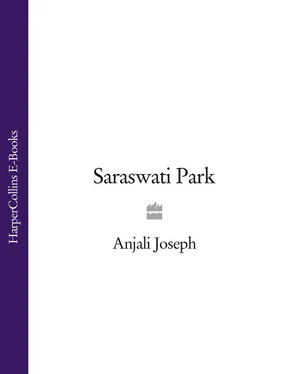Saraswati Park
Anjali Joseph
To my grandparents
Cover Page
Title Page Saraswati Park Anjali Joseph
Chapter One
Chapter Two
Chapter Three
Chapter Four
Chapter Five
Chapter Six
Chapter Seven
Chapter Eight
Chapter Nine
Chapter Ten
Chapter Eleven
Chapter Twelve
Chapter Thirteen
Chapter Fourteen
Chapter Fifteen
Chapter Sixteen
Chapter Seventeen
Chapter Eighteen
Chapter Nineteen
Chapter Twenty
Chapter Twenty-one
Chapter Twenty-two
Acknowledgements
Read On …
About the Author
Copyright
About the Publisher
He held out the book and pointed to the margin. ‘Do you have more like this?’
The bookseller looked distracted. It was nearly five: a tide of commuters would soon spill past the stalls, towards Church-gate and the trains that would take them home. The heat lingered but already the light was changing: it was finer, more golden. From the sea, at the end of the road, there spread a pale brightness, as though the street and the bookstalls were a mirage that would disappear with the sunset.
The thin young bookseller glanced at the open page, where handwritten notes in blue ink danced next to the sober type. ‘You’d have to check,’ he said. ‘I can’t say.’
‘What’s your name?’ the customer persisted. He was a tall, broad-shouldered fellow in his fifties, grey-haired, with steel spectacles on which the last light glinted; there was something pleasant about him.
The bookseller raised an eyebrow. ‘Uday,’ he said. He turned to stare past the customer’s shoulder. At the Flora Fountain crossing, they had started to flood this way: the white-shirted, briefcase-carrying tide. The traffic light held them back.
‘I work just nearby,’ the customer went on. ‘At the post office, the GPO, near VT station. I’m a letter writer, Mohan Karekar. You’re new here, I haven’t seen you before?’
The bookseller grunted, his eyes on the approaching crowd. ‘I’m looking after the stall for my brother,’ he said.
Mohan put the ten-rupee note into his hand. ‘If you see more like that, with the writing on the side, keep them for me,’ he said. He walked into the pressing wave of commuters. He was taller than most; the bookseller saw the back of his steel-coloured head for a moment. Then a fat man with a briefcase stopped at the stall. He took out his handkerchief and wiped his face all over.
‘Da Vinci,’ he said urgently.
The bookseller bent and picked up two copies of the pirated book, each with a slightly different cover. ‘Complete,’ he responded. ‘Every page is there.’
Mohan walked through the crowd, crossed the wide junction, and passed under the long porch of the American Express Bank. The arcades were a nightmare at this time of day, but he navigated his way through the continuous stream of people.
Where the arcades ended, outside the McDonald’s, he waited for the traffic to pause. There was an extraordinary sky today: a bright, deep blue like butterfly wing, with streaks of orange that reached towards the west; it was framed by one of the arches. No one seemed to have noticed; there were trains to be caught.
He crossed the road and walked between the stalls selling office clothing – consignments of white shirts, spread out helplessly on tables – past the bus stand and the side entrance of the station, to the tarpaulin and the gnarled, mythic-looking banyan tree where the letter writers sat, next to the pigeon shelter. It was all right; their tables were chained and padlocked in place, and one of the others would have left his things – sealing wax, muslin, packing needles, the directory of postal codes – at the shop nearby. He patted his shirt pocket, where his train pass was a reassuring flat surface; in his back pocket his wallet was undisturbed.
A group of pigeons flew out of the old tree and into the sky, their wings making the sound of wind on the sea; they crisscrossed each other and made for the west. He tucked the new book under his arm and returned to the station, where a Harbour Line train was pulling into platform two.
When he woke in the morning his wife was still asleep. In the half-light he saw the back of her neck, a few inches away. At the nape, fine hair curled; one shoulder rose under the sheet into a hillock that sheltered her face. The perfume of her neck, which had astounded him when they’d been newly married, was unchanged: intense, overripe; lotuses mixed with ash.
He extricated himself gently from the cotton sheet, which seemed to have become needy during the night. He padded into the bathroom, switched on the water heater, and went to the kitchen. It was good, this moment of silence before the machinery of the day began. It had been different when the children were young: Lakshmi would be up early, making tea and breakfast, and sending them for baths. There would be regular catastrophes: someone needed card paper; someone else had a form to be signed. Now all he had to do was float to the kitchen, still in his kurta-pyjama, and make his tea, and a cup for his wife. The habit irritated her, because she wouldn’t wake for another hour, but he hadn’t been able to come to terms with making tea just for himself, as though she didn’t exist.
In the gloom he moved about, putting water to boil, adding sugar, then crushing a chunk of ginger with the kitchen pliers. At this time, soon after he’d woken, incongruous characters moved through his consciousness: his elder son, Gautam, aged about sixteen, rushing out and saying he didn’t have time for breakfast; the man from yesterday’s book, Lambert Strether, who had just arrived in a foreign city with a vague but important task to execute. The water hissed. Mohan reached for the tea leaves.
Birds were singing stridently outside; the grey covering over everything was slowly being plucked away as the light came. He strained the tea into two cups and covered one, which he took into the bedroom and left on the table next to his wife’s head; he opened his mouth to say ‘Tea’, but thought better of it and went to the living room. Amid the clutter of the big table, the old alarm clock, whose pale green enamel paint had broken into rust spots, said six o’clock. It continued to tick, a loud, busy noise, as he moved towards the window.
He sat in the cane chair; from here he’d be able to watch the lane awake. The boys who took in ironing were opening the door of their blue tin hut, at the mouth of the lane, near the watchman’s shack. One of them brought out a kerosene stove to make tea; another, bare-chested and holding a plastic mug, went off in the direction of the empty plot. The first of the morning walkers appeared, a middle-aged man in white t-shirt and navy shorts. He began to march doggedly up the lane.
Mohan went to the bathroom and emerged half an hour later, quietly happy after the usual encounter with the white tiles, the morning sunshine, and the clear, warm water. Lakshmi got up when he opened the cupboard to take out a clean shirt.
‘Every day,’ she observed. She picked up the covered cup of tea and regarded it at arm’s length. She sighed. Mohan began to do up his buttons. The shirt was crisp; it hung at a polite distance from his body. He started to roll up his sleeves, and followed her to the kitchen to point out, ‘But I didn’t wake you.’
She poured the tea into the saucepan and lit the gas. Her eyes were still heavy. ‘That’s what you think,’ she said. ‘You think I don’t hear you, clanging about in the kitchen.’ She covered her mouth and yawned loudly, a cry of weariness at the tiresome nature of the world.
Читать дальше












